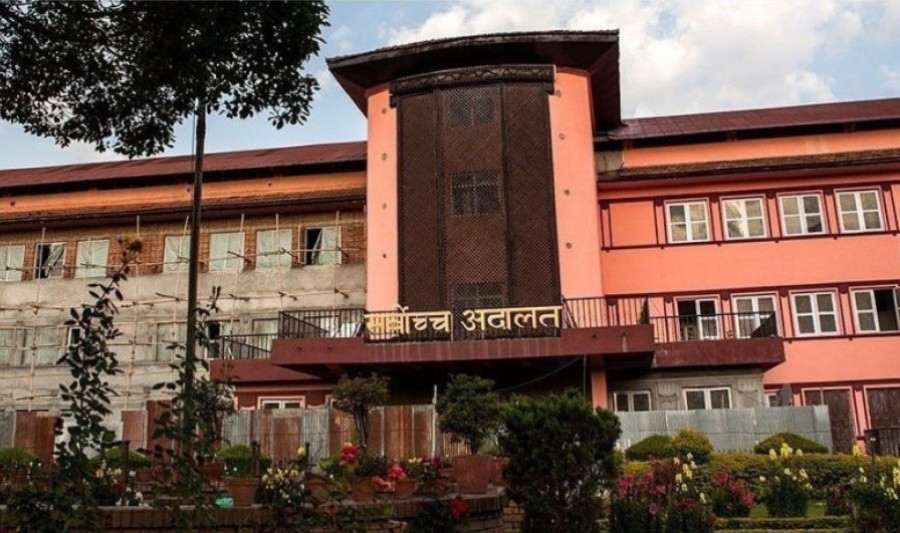National
Two advocates representing amicus curiae present mutually contradicting arguments
Satish Krishna Kharel argues that Oli’s move was unconstitutional while Bijay Kant Mainali claims a majoritarian prime minister has every authority to go for House dissolution.
Binod Ghimire
Two members of the amicus curiae on Wednesday presented mutually contradicting arguments before the Constitutional Bench of the Supreme Court regarding the constitutionality of the House of Representatives dissolution.
While senior advocate Satish Krishna Kharel argued that the dissolution of the lower house was unconstitutional, Bijay Kant Mainali, another senior advocate, however, claimed that a majoritarian prime minister has every authority to go for the dissolution. The bench, after hearing from the plaintiffs and defendants, since Tuesday has given time to the senior advocates representing the amicus curiae to present their arguments.
Former Attorney General Badri Bahadur Karki on Tuesday started presenting his views, saying that the House of Representatives was dissolved with a mala fide intention. He also said the court needs to interpret different constitutional provisions related to the dissolution for clarity.
Kharel, however, said dissolution of the House of Representatives was clearly an unconstitutional move. “The prime minister doesn’t have the prerogative to dissolve the House,” he said. “The dissolution is unconstitutional. The court needs to overturn it.”
President Bidya Devi Bhandari on December 20 dissolved the House based on the recommendation from Prime Minister KP Sharma Oli.
Kharel also rejected Oli’s claim that the dissolution was a political issue which warrants no judicial review. Presenting his written justification in the Supreme Court on January 3, Oli had claimed that he took a political decision by dissolving the House using the inherent authority of a majoritarian government. He had made similar claims in the National Assembly last month and is reiterating them at the party’s mass meetings.
“This is a purely constitutional issue—not political,” said Kharel, who is also a former general secretary of the Nepal Bar Association. “The verdict should be issued based on the constitutional provisions.” He claimed that Article 76 (7) allows the dissolution but only when there is a hung parliament that cannot form a government.
Contrary to Karki, he said the provision of Article 53 (4) of the 1990 Constitution of the Kingdom of Nepal was deliberately removed in the present constitution. Karki on Tuesday had said the provision of Article 53 (4) of the previous constitution remains silent in Article 85 of the present constitution.
Article 53 (4) of the previous constitution said: “His Majesty may dissolve the House of Representatives on the recommendation of the prime minister. His Majesty shall, when so dissolving the House of Representatives, specify a date, to be within six months, for new elections to the House of Representatives.”
Mainali, who was present before the Constitutional Bench to put forth his argument, however, defended Oli’s move saying that a prime minister, who holds a majority in Parliament, can dissolve the House. Both Kharel and Mainali were recommended in the amicus curiae by Nepal Bar Association.
Mainali claimed the constitution has failed to anticipate what happens when no parties agree to form the government. “The House was dissolved as per Article 76 (7) as there was no possibility of forming another government,” he said. “A majoritarian government dissolved the House exercising its authority. The court should accept that the Nepal Communist Party was intact when the decision was taken. The court has every authority for its interpretation. It should make a decision accordingly.”
Mainali also claimed that it is globally accepted that a prime minister in the parliamentary democracy can dissolve the House when he is not comfortable to work freely. In response, Justice Sapana Pradhan Malla asked if the decisions should have been taken based on the constitution, rather than taking international practice into consideration? Mainali, however, said both are important and the prime minister had taken both the situations into consideration while dissolving the House.
While Mainali’s argument was more focused on the principle and international practice, Kharel questioned the constitutional ground for the dissolution. Kharel said upholding the unconstitutional move would also support the dismantling of the present system. “There is no alternative to reinstatement if we accept the decisions that need to be grounded constitutionally,” he said. “The constitutional system is fragile now. Upholding the dissolution means supporting its dismantling.”
Mainali will continue his argument on Thursday, which will be followed by senior advocates Purna Man Shakya and Gita Pathak Sangraula, who were selected by the Supreme Court Bar for the amicus curiae.




 18.12°C Kathmandu
18.12°C Kathmandu














